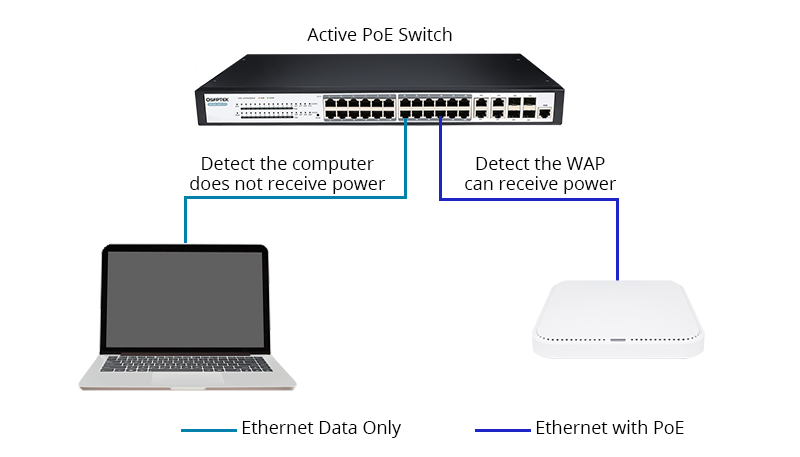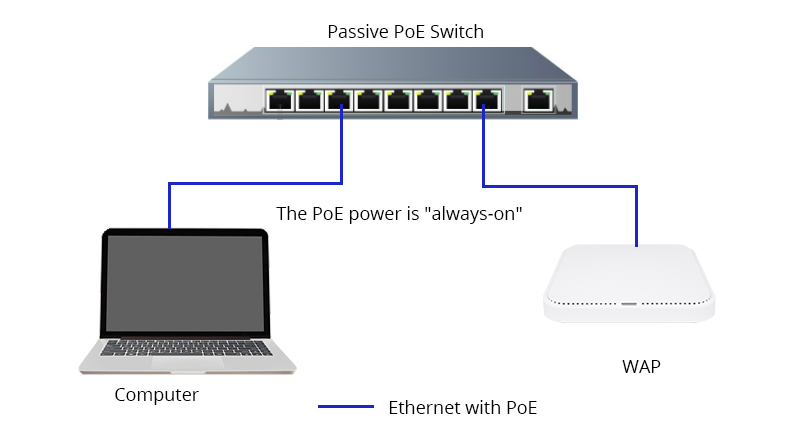Active PoE Switch vs. Passive PoE Switch: What’s the Difference?
PoE (Power over Ethernet) technology is favored for transmitting data and power over Ethernet cables. PoE switches can be classified into two primary types, active PoE switches, and passive PoE switches, with significant differences in features and applications. In this article, we explore the differences between active and passive PoE switches to help you choose the right PoE network switch for specific application scenarios.
Active PoE Switch Overview
What is an Active PoE Ethernet Switch?
Active PoE Ethernet switches comply with the standard PoE specification, also known as standard PoE switches. These switches follow standards such as IEEE 802.3af, IEEE 802.3at, and IEEE 802.3bt. It can also distribute power according to the demand of the equipment to utilize the power resources efficiently. Before power is supplied, the active PoE switch will detect whether the connected device supports PoE to ensure power compatibility. If the device is detected as incompatible, the switch will refuse to supply power to avoid potential damage to non-PoE devices.

Typical Applications of Active Power Over Ethernet Switch
Since Active Power over Ethernet is an industry-recognized standard, it is preferred in most cases. Network systems using PoE, such as surveillance cameras, remote monitoring, and PoE wireless access points, are often managed by active PoE switches, which ensures efficient system operation. In addition, active switches should be used exclusively for systems that use a mix of devices (i.e., some devices get their power over Ethernet while others do not). This is because active PoE switches can intelligently detect device compatibility and avoid providing power to devices that do not support PoE, thus preventing damage to the devices. With this design, active PoE switches can effectively protect devices and ensure the stability and security of the network system.
Passive PoE Switch Overview
What Is a Passive PoE Ethernet Switch?
Passive Power over Ethernet switches also provide power to devices over Ethernet cables, but unlike active PoE switches, they do not have intelligent detection and adjustment features. Passive PoE switches will always output a specific voltage during operation. This design gives passive PoE switches the advantage of simplicity and low cost. Still, it also poses a compatibility risk because all connected devices receive power regardless of whether they support PoE or not, which may cause damage to devices that do not support PoE.

Typical Applications of Passive Power Over Ethernet Switch
Considering the risky and non-standard nature of passive PoE (Power over Ethernet), its optimal usage scenarios are limited. As the technology evolved, passive PoE was phased out because active PoE switches were close in price and offered additional benefits. The only practical scenario for passive PoE is in legacy systems where it is needed. Some end devices are designed for a particular passive PoE setup and may use proprietary or specific injectors and adapters to carry Ethernet and power. If these devices are used in your system, selecting the right passive PoE switch may be more cost-effective than converting all devices to standard PoE injectors and features.
The Differences Between PoE Active vs Passive Network Switch
PoE Passive vs Active Switch: Power Supply Method
PoE passive switches transmit power directly to Ethernet ports without active checking features or intelligent controls. It is easy to damage the equipment. In contrast, PoE active switches use standardized power supply protocols, automatically identifying compatible devices and adjusting the output voltage to ensure a secure and stable power supply. This makes active PoE switches more reliable in complex network environments.
Passive vs Active PoE Switch: Standards Support
In terms of standards support, active PoE network switches follow international standards such as IEEE 802.3af (PoE), 802.3at (PoE+), and 802.3bt (PoE++), which specify different power outputs and device compatibility. On the other hand, passive PoE network switches do not comply with any IEEE standards and usually simply transmit power directly to the device.
Passive PoE vs Active PoE Switch: Ethernet Support
Regarding Ethernet support, active PoE Ethernet switches typically support network speeds of 10/100/1000 Mbps, and transmission distances can be up to 100 meters for modern high-speed network requirements. They can operate in traditional 10/100BASE-T networks and support higher-speed 1000BASE-T PoE networks. In contrast, passive PoE Ethernet switches typically support only 10/100 Mbps transmission speeds and are primarily suited for 10BASE-T and 100BASE-T PoE networks of the past.
Active vs. Passive PoE Switch: Application
Active PoE switches are suitable for applications requiring high reliability and stability, such as enterprise networks and large-scale surveillance systems. Their intelligent power supply and standardized support ensure proper equipment operation and improve the system's overall efficiency. Passive PoE switches have limited use and are being phased out, but they can now be used in specific network connections where all powered devices are already compatible with passive PoE.
Passive PoE vs Active Switch: Cost
Passive PoE switches are typically more economical because they lack complex power management and standardization features. However, these cost savings also come with potential risks, such as unstable device power supply or compatibility issues. Active PoE switches, while more expensive, maybe more cost-effective in the long run due to the additional features they offer and higher reliability, especially in applications that require high performance and stability.
Active or Passive, Which is the Best PoE Switch?
When choosing between an active or passive PoE switch, the first thing to consider is the security and network requirements of the device. For scenarios where you need to power devices such as remote IP phones, IP cameras, wireless access points, etc., an active PoE switch is usually the best choice because it has a power-detection feature that automatically recognizes connected devices and provides appropriate power to ensure their safe and stable operation.
Passive PoE switches are also an option if you are on a tight budget, but you must be extra careful when using them. Passive PoE switches do not have a power detection function, so when purchasing them, you must ensure that their power specifications match exactly the powered device (PD device) to avoid damage to the device due to power mismatch. In addition, never connect computers or other non-PoE devices to a passive PoE switch to prevent unnecessary malfunctions or damage to the device.
Conclusion
By comparing active and passive PoE switches, we can see the significant differences in power supply method, standards support, network performance, application scenarios, and cost. Active PoE switches are the first choice in most network deployments due to their intelligent detection features and IEEE standard-compliant design, which can provide a stable and secure power supply for various network environments. Passive PoE switches, on the other hand, despite their lower price, have minimal usage scenarios due to the lack of intelligent management and standards support.











